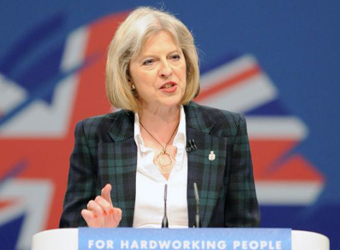British Prime Minister Theresa May’s lead over the opposition Labour Party has narrowed sharply, according to opinion polls published since the Manchester attack, suggesting she might not win the landslide predicted just a month ago.
Four polls published on Saturday showed that May’s lead had contracted by a range of 2 to 6 percentage points, indicating the June 8 election could be much tighter than initially thought when she called the snap vote.
“Theresa May is certainly the overwhelming favorite to win but crucially we are in the territory now where how well she is going to win is uncertain,” John Curtice, professor of politics at the University of Strathclyde, told Reuters.
“She is no longer guaranteed to get the landslide majority that she was originally setting out to get,” said Curtice, a leading psephologist who is president of the British Polling Council.
May called the snap election in a bid to strengthen her hand in negotiations on Britain’s exit from the European Union, to win more time to deal with the impact of the divorce and to strengthen her grip on the Conservative Party.
But if she does not handsomely beat the 12-seat majority her predecessor David Cameron won in 2015, her electoral gamble will have failed and her authority could be undermined just as she enters formal Brexit negotiations.
Sterling on Friday suffered its steepest fall since January after a YouGov opinion poll showed the lead of May’s Conservatives over Labour was down to five percentage points.
An ICM poll for the Sun on Sunday showed May had maintained a 14-point lead, the only poll since the Manchester attack that has shown her lead unchanged.
When May stunned politicians and financial markets on April 18 with her call for a snap election, opinion polls suggested she could emulate Margaret Thatcher’s 1983 majority of 144 seats or even threaten Tony Blair’s 1997 Labour majority of 179 seats.
But polls had shown May’s rating slipping over the past month and they fell sharply after she set out plans on May 18 to make some elderly people pay a greater share of their care costs, a proposal dubbed the “dementia tax” by opponents.
As her lead shrank, May was forced to backtrack on the policy at an appearance before the media on Monday at which she appeared flustered and irritated when taking questions from reporters.
Campaigning was suspended for several days after the Manchester attack but resumed on Friday.
Polls since the attack showed little evidence that May – who as a former interior minister oversaw the police and domestic intelligence agency – had gained support.
“The campaign has changed,” Johnny Heald, managing director of ORB International, said. “Expect to see a forensic focus on Brexit and security over the next two weeks.”
Headline national poll numbers failed to clearly predict Donald Trump’s victory in the 2016 U.S. presidential election, the shock Brexit vote or Cameron’s 2015 election.
Pollsters have said their 2015 findings significantly overestimated support for Labour. While they have since adjusted their methodology to seek to address this, it will not be known until June 9 whether they have now gone too far the other way.
The trend of a decline in May’s lead is clear though.
Opinium said May’s lead had slipped to 10 percentage points, down from 13 points the week before and from 19 percentage points on April 19. Its online survey of 2,002 people was carried out between May 23 and 24.
ComRes said the lead of May’s Conservatives had fallen to 12 percentage points in an online poll of 2,024 carried out May 24-26, from 18 percentage points in a comparable poll on May 13.
ORB said May’s lead had halved to 6 percentage points, according to an online poll carried out May 24-25.
A YouGov survey of 2,003 people between May 25-26 showed May’s lead had narrowed to 7 percentage points from 9 a week ago.
The polls painted a complicated picture of public opinion, with voting intentions being influenced by both the deadly Manchester attack and May’s unpopular social care proposals.
Conservative election strategist, Lynton Crosby, has ordered a return to May’s main message: that only Theresa May can be trusted to negotiate Brexit, the Sunday Times reported.
The newspaper also reported that May’s team was riven by divisions with her joint chiefs of staff, Fiona Hill and Nick Timothy, at loggerheads over the unpopular social care pledge.
When asked about reports of splits, British Defence Secretary Michael Fallon dismissed them as “Westminster tittle-tattle.”
Source: Reuters


